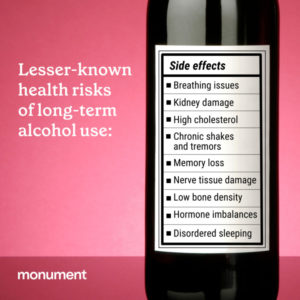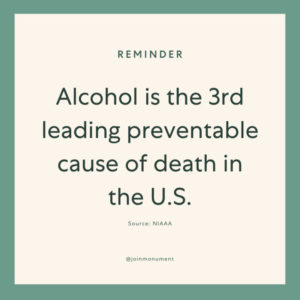Whether it’s early on in health class, through family experiences, or in sporadic doctor visits, many of us learn that excessive drinking is ‘bad for you’ at a young age. However, we often only have a vague understanding of why. Learning more about the specific impact alcohol has on the body’s organ systems can provide a helpful, and even life-changing perspective. While the harmful effects of alcohol can be disconcerting, healing and risk-reduction is within reach. Working with a physician can help you create a personalized plan for making a change.
Short Term vs Long Term Effects of Alcohol Use
Before we dive in, let’s break down the difference between the short-term and long-term effects of alcohol. Alcohol’s short-term effects describe both the sensations associated with intoxication, and the hangover and/or withdrawal symptoms as alcohol leaves your system. Short-term side effects may include:
The long term effects of drinking refer to the ways in which prolonged alcohol consumption alters our wellbeing over an extended period of time. These changes can be harder to recognize since they often develop gradually over the years, and include increased risk of various diseases and cancers. Learning about the long-term effects of alcohol and speaking with your physician can help prevent more severe damage and reduce alcohol-related risk.
So how exactly can heavy alcohol use affect someone in the long-term? Here’s what to consider as you reflect on your own relationship with alcohol.
Long Term Effects of Alcohol Use
1. High Blood Pressure
Drinking alcohol can raise blood pressure due to the alcohol itself, and also the sugar and calories that are often in alcoholic drinks. Up to 16% of all individuals with consistent medical high blood pressure, also known as hypertension, are diagnosed due to heavy drinking.
2. “Alcoholic Cardiomyopathy”
Unhealthy alcohol use can cause a change in shape and loss of motion in the lower chambers of the heart, which is a medical condition called alcoholic cardiomyopathy. This condition affects blood circulation, which can lead to other health problems.
3. Increased Risk of Blood or Brain Disease
Unhealthy alcohol use is one of the most consistent factors that increases the likelihood of developing a blood or brain vessel blockage disease, respectively called coronary artery disease and cerebrovascular disease. These conditions have very serious consequences, and can even manifest as heart attacks and strokes when blockages prevent blood flow to the brain or heart.

4. Liver Disease
Heavy drinking can affect the liver, which is our body’s natural detoxifying organ. Alcoholic liver disease is a spectrum of disease that includes steatosis, where an excess of fat builds up in the liver, and alcoholic hepatitis, where liver cells are chronically inflamed. The most severe form of liver disease is alcoholic cirrhosis, which is where fatty liver tissue is replaced by scar tissue and can no longer function. Liver damage can lead to irreversible symptoms including jaundice, swelling of legs and abdomen, internal bleeding, fever, brain fog, and nausea.
5. Risks to Respiratory Ability and Pneumonias
Alcohol use suppresses the neurological pathway of the brain that is responsible for our natural inhalation and expiration function, which is why excessive drinking can lead to breathing issues.
Unhealthy alcohol intake can also inhibit the respiratory tract’s natural system for eliminating pathogens, making someone who drinks heavily much more prone to different types of bacterial, fungal, and viral pneumonias. Lastly, in some severe cases of liver cirrhosis, fluid can build up in the chest cavity and impair respiration.
6. Kidney Damage
Our kidneys help regulate our body’s natural fluid balance through what’s called the renal system. Heavy fluid intake, such as excessive amounts of alcohol, can disturb this natural functioning. Binge drinking and other heavy drinking habits can overwhelm the renal system and cause fluid and chemical imbalances, which are characterized by symptoms like dizziness, fatigue, weakness, and can lead to more serious health consequences.
7. Gastrointestinal Consequences
Another long-term consequence of unhealthy alcohol use is a chronic irritation of the delicate lining of the gastrointestinal tract. This can lead to various dangerous and even life-threatening complications including esophageal tears, bleeding, and hemorrhoids.
8. Alcoholic Pancreatitis
The pancreas is an organ in the middle abdomen. Relatively new research reveals that the pancreas aids the liver in metabolizing and detoxifying alcohol. However, binge drinking can be toxic to the delicate pancreas cells and cause a painful condition called alcoholic pancreatitis. Alcoholic pancreatitis symptoms include abdominal pain, nausea, vomiting, and more.
9. Chronic Diarrhea
Our intestines normally reabsorb nutrients and remove waste. However, when the intestines become irritated and inflamed by too much alcohol, they lose their efficiency, which manifests as chronic diarrhea.

10. Increased Risk of Gastrointestinal Cancers
Drinking heavily over an extended period of time is a strong risk factor in a number of cancers connected to the digestive system including:
- Tongue
- Mouth
- Pharynx (throat)
- Larynx (voice box)
- Esophagus
- Stomach
- Pancreas
- Colon
- Liver
The likelihood of developing one of these cancers also depends on an individual’s genetic factors, health conditions, and other lifestyle habits, such as smoking tobacco.
11. Loss of Memory
50-70% of people who drink heavily are found to have varying degrees of cognitive impairments. This includes alcohol-related dementia. The severity of this form of dementia is “dose-dependent,” meaning a person who drinks five drinks daily will typically have fewer symptoms than someone who drinks ten drinks daily.
Memory blackouts are also a side effect of binge drinking and heavy drinking, which can put an individual’s safety at risk.
12. Damage to Nerve Tissue
Excessive alcohol use can lead to a serious form of peripheral nerve damage called alcohol-related neuropathy. This condition develops due to the toxic effects of alcohol, and the nutrient deficiencies associated with unhealthy alcohol consumption. This form of alcohol-related brain damage often feels like a tingling in the ends of the limbs and feet and can result in a loss of mobility and/or the ability to carry out normal bodily functions.
13. Head Injury From Accidents While Under the Influence
Alcohol impairment can lead to serious falls or vehicular collisions resulting in traumatic brain injuries. In fact, 52% of people admitted to the hospital with a traumatic brain injury have a measurable amount of alcohol in their system when they arrive at the emergency room.
14. Headaches and Migraines
Any amount of alcohol can cause an increased risk of headaches, with symptoms worsening with greater consumption. Wine-drinking, in particular, is a common trigger for migraine headaches because of factors like dehydration, histamines, and sugar.

15. Chronic Shakes and Tremors
Along with alcohol withdrawal-related shakes and tremors, unhealthy alcohol use can also cause chronic movement disorders and postural tremors. Unlike the shakes and tremors associated with alcohol withdrawal, these disorders may not improve after stopping alcohol intake because of the toxic effects of alcohol on delicate nerve cells.
16. Increased Risk of Sleep Disorders
Most people are aware that alcohol can negatively affect sleep quality. However, the connection between alcohol and various sleep disorders is often lesser-known. Studies show that people with unhealthy drinking habits have a higher risk of developing a nightmare disorder and sleep apnea. They are also three times more likely to develop periodic limb movement disorder.
17. High or Low Blood Sugar
Alcohol is high in “empty calories,” meaning it lacks nutrients. Because of this, heavy drinkers are particularly susceptible to sudden periods of low blood sugar, or hypoglycemia. Alcohol also suppresses the body’s natural responses to when it senses low blood sugar starting to occur, which makes these dips more frequent and severe.
Conversely, unhealthy drinking can also cause high blood sugar. The pancreas normally releases insulin, which helps the body respond to high blood sugar. Alcohol, however, inhibits this function of the pancreas, which leads to high blood sugar or hyperglycemia. This can also eventually result in a form of diabetes related to pancreas dysfunction.
18. Dysregulated Hormones
Alcohol can have a negative effect on many important hormones. Firstly, unhealthy drinking habits can lower dopamine levels and decrease endorphins over time. The way extended alcohol use depletes these “happy hormones” can exacerbate or cause mental health conditions like anxiety and depression.
Drinking also impacts the sex-related hormones of testosterone and estrogen. Drinking can lower testosterone levels and cause sexual dysfunction. This can also create a negative correlation between alcohol and sex drive. Alcohol consumption can also raise estrogen levels. This can deregulate menstrual cycles, cause or worsen infertility, and most disconcertingly, be a risk factor for some estrogen-mediated breast cancers.
19. Low Bone Density
Considering these hormonal dysregulations, unhealthy alcohol use can also contribute to low bone density for older men and post-menopausal women. Low bone density can increase the likelihood of osteoporosis, vertebral fractures, wrist fractures, and hip fractures.
20. High Cholesterol
Lastly, hormonal imbalances related to alcohol use can also deregulate naturally-occurring cholesterol in the body and contribute to high cholesterol, which is a risk factor for heart disease.
It’s important to note that these are only some of the long-term health risks associated with heavy drinking. This list is by no means exhaustive, and doesn’t include short-term health risks, including alcohol withdrawal. The symptoms of alcohol withdrawal can be dangerous and even life-threatening. If you think you’re experiencing acute alcohol withdrawal symptoms, please seek medical attention immediately.
If you believe you might be experiencing acute alcohol withdrawal, please contact your healthcare provider immediately and visit https://findtreatment.gov/ to find a location to get supervised detox near you. If this is a medical emergency, call 911.

How to Get Treatment for Alcohol Use
While the health conditions associated with heavy alcohol use can be very serious, creating a healthier relationship with alcohol can reduce these risks and give your body time to heal in incredible ways. Luckily, there are many treatment options, alcohol support groups, and AA alternatives available to you. There are treatment facilities, in-person meetings, and online treatment platforms, like Monument. At Monument, you can work with a physician, such as myself, to better understand your risks given your health history and drinking habits, and receive a personalized treatment plan. Your treatment options include medication to stop drinking, alcohol therapy, and peer support.
If you or someone you love is looking to make a change, Monument is here to provide guidance by connecting you with licensed professionals. You are not alone.
